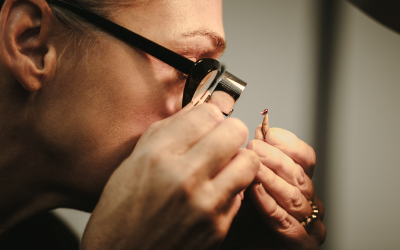How to Deal with appraisers and Buyers When Selling Used Jewelry

Selling used jewelry can be an excellent way to declutter your collection, make some extra cash, or even upgrade to new pieces. However, dealing with appraisers and buyers in the process can sometimes feel overwhelming. To ensure a smooth and successful transaction, it's essential to be prepared and informed. In this blog, we'll provide you with valuable tips and insights on how to navigate the appraisal and buyer process when selling used jewelry.
- Research and Understand Your Jewelry: Before approaching appraisers or potential buyers, take the time to research and understand your jewelry. Identify the type of metal, gemstones, and any unique characteristics or historical value it may possess. This knowledge will enable you to communicate effectively and answer any questions buyers may have.
- Get Multiple Appraisals: To determine the value of your jewelry, seek professional appraisals from reputable jewelers or certified gemologists. Getting multiple appraisals allows you to compare estimates and ensures that you have a fair understanding of the market value. Be prepared to pay a fee for this service, as it's a valuable investment in accurately pricing your jewelry.
- Prepare Your Jewelry for Sale: To make a positive impression on potential buyers, clean and polish your jewelry before showcasing it. This step highlights the jewelry's best features and can enhance its overall appeal. Consider using mild soapy water, a soft brush, or a professional jewelry cleaning kit to restore its sparkle.
- Consider the Selling Method: There are various avenues for selling used jewelry, each with its pros and cons. Options include online marketplaces like eBay or specialized jewelry selling websites, consignment stores, pawnshops, or working with local jewelry buyers. Research these options and choose the one that aligns best with your goals and preferences.
- Set a Realistic Price: Based on the appraisals and market research, set a realistic price for your jewelry. Consider factors such as the item's condition, age, rarity, and current market demand. While sentimental value may be important to you, potential buyers typically focus on the objective value of the piece. Be open to negotiating, but also know your bottom line.
- Document Your Jewelry: To establish credibility and provide transparency, document your jewelry's details, including certificates of authenticity, invoices, or any supporting documentation. This documentation can reassure buyers about the item's quality and value.
- Advertise Effectively: When listing your jewelry for sale, create high-quality, well-lit photographs that showcase the piece from multiple angles. Craft an accurate and compelling description that highlights its unique features, such as gemstone cut, clarity, carat weight, and metal type. Be honest about any wear or flaws to manage buyer expectations.
- Engage with Potential Buyers: When interacting with potential buyers, be responsive, professional, and open to inquiries. Answer questions promptly and provide additional information when requested. Be cautious of scams or suspicious buyers and prioritize safety when meeting in person.
- Consider Professional Consignment: If you're unsure about selling your jewelry on your own, consider working with a reputable consignment store. Consignment services handle the marketing, pricing, and selling process for you, providing expertise and access to a broader customer base. Understand the consignment terms, fees, and commission structure before entering into an agreement.
- Trust Your Instincts: Lastly, trust your instincts when choosing a buyer or finalizing a sale. If something feels off or you have reservations, it's better to explore other options or seek professional advice before proceeding.
Selling used jewelry can be an exciting and rewarding experience, especially when armed with the right knowledge and approach. By doing these ten steps, you'll know how to deal with appraisers and buyers when selling your used jewelry.

